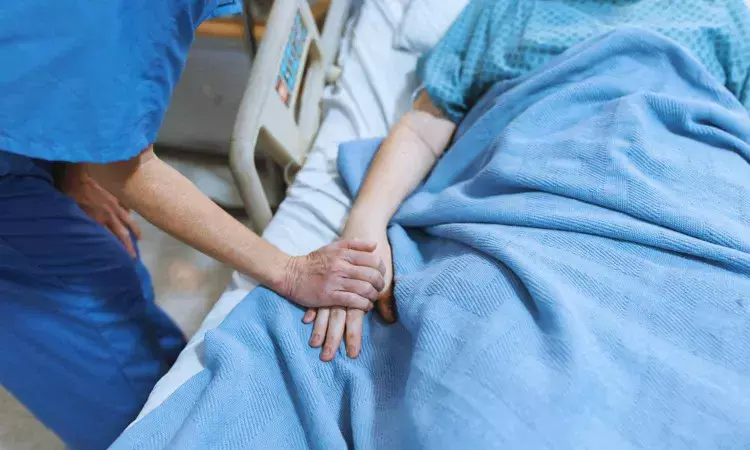- Home
- Medical news & Guidelines
- Anesthesiology
- Cardiology and CTVS
- Critical Care
- Dentistry
- Dermatology
- Diabetes and Endocrinology
- ENT
- Gastroenterology
- Medicine
- Nephrology
- Neurology
- Obstretics-Gynaecology
- Oncology
- Ophthalmology
- Orthopaedics
- Pediatrics-Neonatology
- Psychiatry
- Pulmonology
- Radiology
- Surgery
- Urology
- Laboratory Medicine
- Diet
- Nursing
- Paramedical
- Physiotherapy
- Health news
- Fact Check
- Bone Health Fact Check
- Brain Health Fact Check
- Cancer Related Fact Check
- Child Care Fact Check
- Dental and oral health fact check
- Diabetes and metabolic health fact check
- Diet and Nutrition Fact Check
- Eye and ENT Care Fact Check
- Fitness fact check
- Gut health fact check
- Heart health fact check
- Kidney health fact check
- Medical education fact check
- Men's health fact check
- Respiratory fact check
- Skin and hair care fact check
- Vaccine and Immunization fact check
- Women's health fact check
- AYUSH
- State News
- Andaman and Nicobar Islands
- Andhra Pradesh
- Arunachal Pradesh
- Assam
- Bihar
- Chandigarh
- Chattisgarh
- Dadra and Nagar Haveli
- Daman and Diu
- Delhi
- Goa
- Gujarat
- Haryana
- Himachal Pradesh
- Jammu & Kashmir
- Jharkhand
- Karnataka
- Kerala
- Ladakh
- Lakshadweep
- Madhya Pradesh
- Maharashtra
- Manipur
- Meghalaya
- Mizoram
- Nagaland
- Odisha
- Puducherry
- Punjab
- Rajasthan
- Sikkim
- Tamil Nadu
- Telangana
- Tripura
- Uttar Pradesh
- Uttrakhand
- West Bengal
- Medical Education
- Industry
Developing novel drug for acute MI, acute kidney injury, and subsequent chronic organ failure: Study

Acute myocardial infarction and acute kidney injury are life-threatening conditions caused by ischemia, resulting from reduced or blocked blood flow to organs. Although early restoration of blood flow improves survival, many patients still develop chronic heart or kidney failure. The mechanisms driving this transition from acute tissue injury to chronic dysfunction remain poorly understood, and effective treatments are lacking.
In this study, researchers focused on the immune receptor CD300a, which suppresses immune cell activation. Using a mouse model with genetic deficiency of CD300a, they investigated the progression from AMI and AKI to chronic heart and kidney failure. The findings revealed that CD300a deficiency attenuated cardiac dysfunction caused by AMI and reduced subsequent cardiac fibrosis, thereby preserving cardiac function. Similarly, renal dysfunction following AKI was less severe, renal fibrosis in chronic kidney failure was diminished, and renal function was maintained.
The mechanism underlying these protective effects is as follows: in ischemic heart and kidney tissues, CD300a deficiency enhanced macrophage-mediated phagocytosis of dead cells, reducing inflammation. Moreover, in CD300a-deficient mice, SiglecF-/lo neutrophils exhibited increased production of angiogenic and antifibrotic factors, which inhibited progression to chronic organ failure. Importantly, administration of neutralizing antibodies against CD300a in mice produced outcomes comparable to those observed in CD300a-deficient models, suppressing the progression to chronic heart and kidney failure.
The research group now aims to evaluate the efficacy and safety of humanized anti-human CD300a neutralizing antibodies in clinical studies, with the ultimate goal of developing novel therapeutic agents for acute tissue injury and subsequent chronic organ failure in the heart and kidney.
Reference:
Nanako Nishiyama, Hitoshi Koizumi, Chigusa Nakahashi-Oda, Satoshi Fujiyama, Xuewei Ng,Hanbin Lee, Fumie Abe,CD300a immunoreceptor regulates ischemic tissue damage and adverse remodeling in the mouse heart and kidney, Journal of Clinical Investigation, DOI:10.1172/JCI184984
Dr Kamal Kant Kohli-MBBS, DTCD- a chest specialist with more than 30 years of practice and a flair for writing clinical articles, Dr Kamal Kant Kohli joined Medical Dialogues as a Chief Editor of Medical News. Besides writing articles, as an editor, he proofreads and verifies all the medical content published on Medical Dialogues including those coming from journals, studies,medical conferences,guidelines etc. Email: drkohli@medicaldialogues.in. Contact no. 011-43720751


